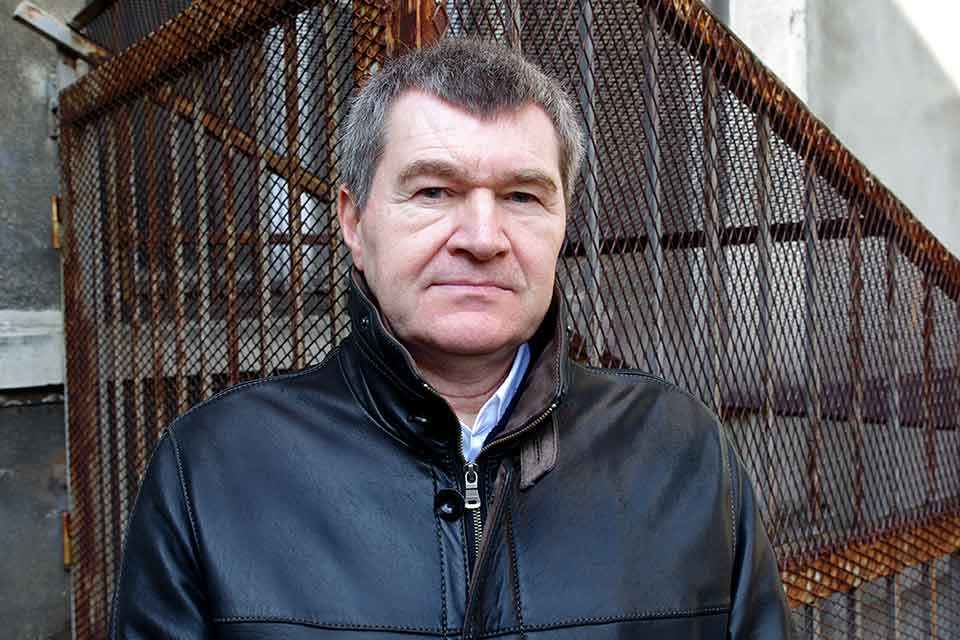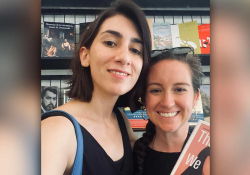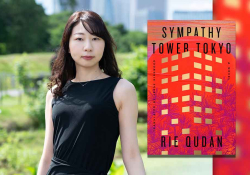Ruminations on Defeat: A Conversation with Antoine Volodine

Antoine Volodine (b. 1950) does not exist, not exactly. He is one of the authors and the self-titled spokesperson of postexoticism, a movement that comprises 49 authors to date, with a total production of 343 texts. What makes this a unique feat in contemporary French fiction is that all 49 authors are also heteronyms of a singular author: the same Antoine Volodine. Other writers before Volodine have explored heteronymic fiction, Fernando Pessoa among the most famous, but Volodine has most likely taken this literary experimentation to its limits. In postexoticism, heteronymy deploys itself as a complex literary montage, halfway between schizophrenia and artistic grandiose, and exists outside of traditional literary conventions, with its own codes and aesthetics. It is both everywhere and nowhere, and we, readers, are nothing more than occasional drifters there, our relation to its texts being, in the best of times, fraught with uncertainty. As such, postexoticism stands undoubtedly as one the most poignant and compelling literary movements of the age.
The questions in this interview are addressed to Antoine Volodine, who will act as a spokesperson for all postexotic authors.
Jean-Louis Hippolyte: It seems quite difficult or downright impossible for readers to establish a set chronology for the postexotic oeuvre, as one may do with Proust’s In Search of Lost Time or Balzac’s Human Comedy. Could you say a few words about what may be the organizing principle of the postexotic chanson de geste or saga?
Antoine Volodine: There was no grandiose construction plan, laid out from the first book and scrupulously applied thereafter. The volumes added on spontaneously and anarchically, following an order of composition that was rarely upended. Accordingly, they added up to an edifice with many entryways that can be visited according to the inspiration of the reader. I mean that we can begin the exploration of the postexotic universe by reading virtually any of its books. That’s a good thing, especially when concerning foreign translations. Nowadays, publishing houses may choose to publish postexotic works in an order that differs from the original one. The same thing is happening in Italy where a publishing house (whose name sounds hardly Italian: 66th & 2nd) has begun to translate all of our books. We appreciate such publication programs that follow a different chronological path than ours.
In that sense, the postexotic structure is very flexible, and the layout largely remains the same when reproduced in other languages: an artistic object in prose, composed of forty-nine titles and destined to close with the last sentence, which calls for silence: “I stop talking.” It would be futile to seek out recurring characters or events reoccurring under various viewpoints, spaces that a narrator would revisit in a second or third book. That only happens once, with Inner Harbor, written in Macau in 1993, which can now be associated to Macau, a ghostly return to a place that was considerably disfigured and became unrecognizable after twenty years of insane, cultureless real-estate development from mainland China. One could not translate and publish Macau before Inner Harbor. Also, I spoke thoughtlessly of the absence of recurring characters in postexoticism. That is false: Bobby Potemkine and his friends turn up regularly in Manuela Draeger’s early books, which were written for young and adult readers. But again, the order of publication matters little.
In the end, what determines the general organization of the postexotic chanson de geste is its background, the upstream presence of a carceral choir, a fragmentary literature that is whispered or screamed by tens of prisoners in an imaginary prison that is an integral part of our structure, an ideological and literary constant that only emerges clearly in one book—Post-Exoticism in Ten Lessons, Lesson Eleven. In reality, this presence gives the whole edifice its frame and coherence and assures its continuity regardless of its starting point: it is the starting point. And of course, it is in the choir that one can tease out some recurring elements of our explanations and narratives: revolutionary extremism, political despair, humanity’s widespread defeat, magic, dreams, the preeminence of images over words.
What determines the general organization of the postexotic chanson de geste is its background, the upstream presence of a carceral choir, a fragmentary literature that is whispered or screamed by tens of prisoners in an imaginary prison.
Hippolyte: Let’s speak about the general context of this literary edifice: the apocalypse or, rather, the postapocalypse. Why do you choose to place your stories in this setting?
Volodine: The apocalypse is almost never the subject of our books. What has interested us all along is to take survivors, long after the catastrophe, as the center of the narrative. Individuals, men and women, whose daily environment includes ruins, a dearth of technology, meager resources, and the quasi-disappearance of the human race. This makes our characters rougher but also more real. Humble heroes walking across an empty land, like actors on a theater stage. Postcatastrophe is only a setting; what matters in the story we are telling is to set up figures of courageous, exhausted, and fatalistic men and women, lost in a hostile present and perpetually ruminating a past both personal and collective. The extreme poverty of their condition allows us to underscore their romantic, political, and moral obsessions, their desires and fears, without any kind of social interference. Allows us to accompany them.
The nonexistence of a context for a mass-organized society allows for the introduction of magic, witchcraft, and fantastical concepts like immortality or life-after-death in very small groups of characters. Postapocalypse, humanity’s extinction period, and the end of an industrial universe allow for strong images and offer postexotic authors significant narrative freedom while preserving, within our attention, the interior discourse and visions of our protagonists.
Hippolyte: Besides references to political and environmental dystopia, I would like to broach how religion, or rather spirituality, relates to postexoticism. In Brothers-Witches and a number of other texts, sorcerers, shamans, and visionaries (or cranks) keep appearing. Was there a progressive sedimentation of these references during the writing process? Should we focus on the (growing) importance of Buddhism and other traditions, like Shintoism, in these texts?
Volodine: I personally practiced martial arts well before the publication of my first book, Jorian Murgrave’s Comparative Biography, and I was still practicing in the early 1990s. That would be a concrete link to Asian religion, Shintoism for starters. Concrete, but more linked to a discipline than a real adherence to an ideology, of course. I recently became reacquainted with Shintoism (outside of martial arts) during a long stay in Kyoto. One can see the rigorous martial influence of kendo in A Ship from Nowhere. But Shintoist tradition is too intricately tied to Japanese thinking to be introduced in deliberately internationalist postexotic fictions. I regret it, since one of my objectives in Japan was to bring Shintoism to postexoticism like we had previously introduced Tantric Buddhism to our narratives, or at least the Bardo Thödol, the Tibetan Book of the Dead. One of the foremost dimensions of postexotic writing is this reference to the voyage of the living after death, to the point that many of the characters who appear are already dead as they embark upon their literary lives on the first page of our books.
There is also a great affinity to Buddhism in our books, though our approach is primarily poetic, and hardly religious. The same goes for shamanism, through all its variants, Amazonian in Naming the Jungle, Korean in Melvido’s Dreams, Siberian in most other texts. It is certain that the invention of these different types of magic, breathing, dancing, and singing correspond to the strata of a culture that coalesced over the years. In Post-Exoticism in Ten Lessons, Lesson Eleven, Lutz Bassman relates how the Bardo Thödol was introduced and adopted by the prisoners who comprise the central choir of published postexoticism.
What has interested us all along is to take survivors, long after the catastrophe, as the center of the narrative.
The ideological tradition of postexotic authors was certainly influenced, gradually, by personal discoveries, intellectual evolution, and, simply, aging. Envisioning an absolute, rigid, totalitarian background to our writing would be too rash. Everything evolves. You spoke of progressive sedimentation, and you are right: one of the objectives of our collective literary performance is also to impart four decades of literary writing.
Hippolyte: References to Marxism abound in postexotic works, but often in relation to the failure of the revolution. Again, we are in the “after.” Derrida spoke of the reemergence of Marx’s specter and read the incipit of the Communist Party Manifesto (“a specter is haunting Europe, the specter of communism”) not as a specter of the future but of the past, like Hamlet’s father. He coined the term “hantology.” Is this a critical tool that may apply to postexotic texts, since the notion of haunting occupies such an importance place in them?
Volodine: Postexotic writing is, on the whole, a rehashing of failure, a rumination on defeat. In reality, although the stage where our characters appear is projected in an uncertain, undated, and wrecked future, what is taking place is a return to the past, through memories, memories of dreams, fantasies, reconstitutions shifted through dream and imagination. Of course, the twentieth century is the object of this vast fresco, with its succession of atrocious humanistic nightmares, one that goes beyond Nazism and Stalinism and affects the whole of the world, all the countries on the map, for the entire century. What postexotic authors are brooding over is this abyss that threatens humanity as much as the political regimes that it chose. An abyss that deepens today, with the exhaustion of resources, the permanent temptation of another world war, in short with our entrance into a state of barbarism we will never exit.
For postexotic authors and their characters, the intellectual references to communism recall an alternative to barbarism that humanity elected not to follow, that it took no part in and never will. The nostalgia that materializes throughout postexotic works may have been nostalgia of a failed, disfigured, improbable, global revolution, always delayed, but, from the end of the 1980s, after the shocking dismantling of the USSR, it became nostalgia for what could have happened. In that sense, we can definitely speak of a ghost, defined by its inconstancy.
Hippolyte: Which of the postexotic authors seems to have the strongest emotional or stylistic impact for the readers? Why?
Volodine: Obviously, I will not answer that question. Even though each postexotic author has his or her own specific poetics and style, we maintain the nostalgia of a collective literary construct, one that is assumed by heteronyms and spokespersons who prefer the status of “anonymous heteronyms” to the one of “fully fledged authors.” The last works of postexoticism will likely be signed by Infernus Iohannes, named after a collective, which will allow us to put an end to a useless and perverse individuation. At least that is what we think.
Hippolyte: Can you speak briefly about the importance of paranoia in postexotic works, not just as a theme but also as a constitutive part of its poetics?
What matters in the story we are telling is to set up figures of courageous, exhausted, and fatalistic men and women, lost in a hostile present and perpetually ruminating a past both personal and collective.
Volodine: In our early books, the paranoid obsession of being surveilled, spied on, and tracked inside the texts themselves led postexotic authors to adopt techniques of dissimulation, double-talk, and encryption, which played an enormous role stylistically and thematically. Take for instance Ellen Dawkes’s small text “Let’s Talk about Something Else” in Post-Exoticism in Ten Lessons, Lesson Eleven. In order to hide the secrets that the police are constantly pursuing while hewing close to the texts, the postexotic authors elect to circumvent, de-realize, and obfuscate the truth, turning these processes of encryption into an aesthetics that will satisfy both the first circle of readers (the prisoners who listen, morosely) and the second circle of bookstore readers, outside the walls. Two books are constructed this way: Lisbon, Last Margin and View over the Ossuary.
But afterward, with the passing of time, this desire to deceive a potential code-breaking policeman gave way to a more schizophrenic writing. Topics and poetics became more naturally imbued with make-believe, one freed from double-talk. There are many examples, but since we all deeply value our comrade Manuela Draeger, I would like to quote her novel Eleven Sooty Dreams, where equalitarian and fraternal aspiration mix particularly well with fantasy, far from any paranoid avoidance of delicate precisions.
Hippolyte: Since you announced the programmed end of postexoticism, I would like to conclude with two adjoining questions: (1) Do you plan to keep writing after this end?
What postexotic authors are brooding over is this abyss that threatens humanity as much as the political regimes that it chose.
Volodine: Reaching this conclusion is something both risky and difficult. I hope that I will succeed in bringing this literary performance to a close before death (or some other cataclysm) puts an end to it. Postexoticism is a lifelong endeavor, and I cannot imagine the birth of a new project after this one, which took forty years to be concluded. Bringing postexoticism to the world, completing its structure, finishing, and then being quiet add up to an ambitious program. I am working toward its conclusion, and I think that, afterward, there will be nothing else.
Hippolyte: (2) Have you thought about how postexoticism may be recycled by others, through fiction or other mediums (theater, cinema, etc.)? In other words, is postexoticism meant to disappear or be transmitted forward, and maybe evolve in unsuspecting directions?
Volodine: Once the forty-nine-titles-long postexotic object is complete and exists in the real literary world (with its uncertain evolution, from translations to its various receptions in other countries and languages), it will exist as an immutable object. Other artists, and readers of course, may do with it what they will. And yet many bridges between postexotic fictions and other artistic mediums already exist. Ten or so theatrical adaptations of Volodine and Bassman have already been directed or are being directed, as well as musical adaptations, for a long time with composer Denis Frajerman and more recently with Aurélien Dumont. The circle of postexotic sympathizers includes creators from various disciplines who, from time to time, elect to walk along our path. Whether it be literature, music, photography, the visual arts, etc., something is passed on. And that is wonderfully encouraging.
March 2019
A Volodine Primer in English
 Naming the Jungle
Naming the Jungle
Trans. Linda Coverdale
New Press
 We Monks and Soldiers
We Monks and Soldiers
Lutz Bassmann
Trans. Jordan Stump
University of Nebraska Press
 Post-Exoticism in Ten Lessons, Lesson Eleven
Post-Exoticism in Ten Lessons, Lesson Eleven
Trans. J. T. Mahany
Open Letter
 In the Time of the Blue Ball
In the Time of the Blue Ball
Manuela Draeger
Trans. Brian Evenson
Dorothy Project
 Radiant Terminus
Radiant Terminus
Trans. Jeffrey Zuckerman
Open Letter










